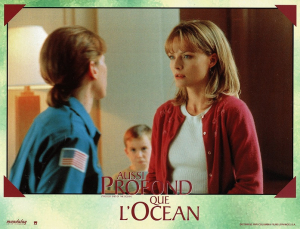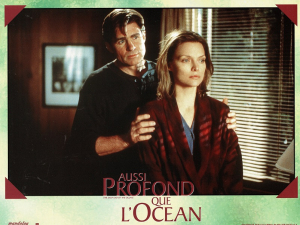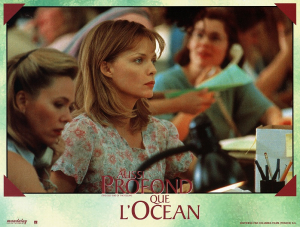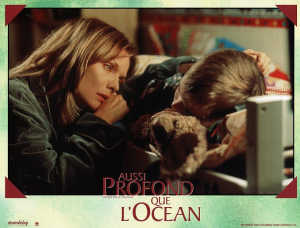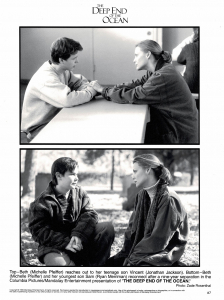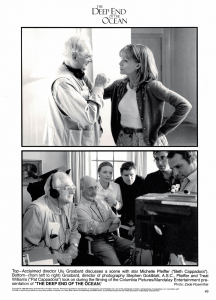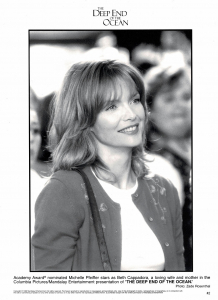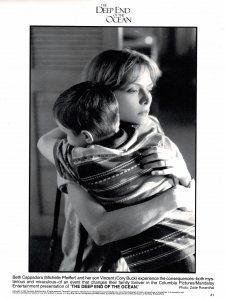The Deep End of the Ocean
Are we at the deep end, Mom?
This is the ocean, Ben. There is no deep end of the ocean.
It looks too deep.
Don’t be afraid. Mama would never let the ocean snatch you away.
The Deep End Of The Ocean
Production Information
When Jacquelyn Mitchard’s novel “The Deep End of the Ocean” hit bookstores in June 1996, it was hailed as a modern masterpiece—the kind of story that comes along once in a generation. Now, from three-time Academy Award° nominee
Michelle Pfeiffer and critically acclaimed director Ulu Grosbard comes one of the most eagerly anticipated films of the season. Based on Mitchard’s story of the heartbreak of losing a child and the power of family to survive against unfathomable odds, Mandalay Entertainment proudly presents The Deep End of the Ocean.
Beth Cappadora (Pfeiffer) is like most mothers—loving, devoted, and occasionally overwhelmed by the demands of caring for her family and maintaining a successful career as a photographer. With her three small children in tow, she arrives at a hotel for her 15th high school reunion weekend. In the middle of the crowded lobby, she looks away for a moment—and in that moment her three-year-old son Ben disappears. A frantic search turns up nothing; he has vanished in the blink of an eye, seemingly without a trace.
As hours turn into days, days into months, Ben’s disappearance has a devastating effect on Beth’s ability to cope, creating tensions between her and her husband Pat (Golden Globe nominee Treat Williams) as well as her older son, Vincent (Cow Buck). Time goes by, and with Pat’s help, Beth and the children go back to leading a seemingly normal life.
Then one day, some nine years later, a boy knocks on the Cappadoras’ door, a boy who is the same age that their missing son would be now. Something strikes Beth about the color of his hair, the shape of his eyes, the curve of his cheek… Her mind dares to entertain the impossible thought—could it be him?
With the help of a tenacious police detective who over the years has become a close friend (Academy Award® winner Whoopi Goldberg), Beth, Pat, their daughter Kerry and their troubled teenage son Vincent (Emmy award winner Jonathan Jackson) are reunited with Ben (Ryan Merriman), who now goes by the name of Sam and has been raised by his loving, adoptive father George (John Kapelos).
The joy that Beth and Pat experience at the miraculous reappearance of their son soon turns to concern as they realize that, since he has no memory of them or his brother or sister, they are all little more than strangers.
Despite Pat’s resistance, it becomes increasingly clear to Beth that, however strong their love of and need for Sam, they must face the reality of his growing unhappiness at being deprived of the home he has known most of his life. What might be best for them may not be best for Sam.
In the end, Beth’ selflessness, conviction and courage to act opens the way for Sam to bring a measure of hope to the family.
Based on the No. 1 New York Times bestseller, The Deep End of the Ocean stars Michelle Pfeiffer as Beth Cappadora, Treat Williams as her husband Pat, Jonathan Jackson as their son Vincent and Whoopi Goldberg as Detective Candy Bliss. Directed by Ulu Grosbard from a screenplay by Stephen Schiff, the film is produced by Kate Guinzburg and Steve Nicolaides. Frank Capra III is the executive producer.
Rounding out the talented creative team are Academy Award®-nominated director of photography Stephen Goldblatt and Academy Award®-winning editor John Bloom, as well as production designer Dan Davis and costume designer Susie DeSanto.
Famed composer and Oscar® winner Elmer Bernstein wrote the score. The Deep End of the Ocean will be in theaters nationwide on March 12.
About the Book
“The Deep End of the Ocean” landed on producer Kate Guinzburg’s desk long before it became a No. 1 bestseller. “This novel was sent to me very early on in galleys,” she recalls. “It’s one of those books that you just can’t put down. I was up until three in the morning reading it.”
The character of Beth particularly appealed to Guinzburg, who has always seen books as a great jumping off point for films. She immediately called producing partner Michelle Pfeiffer and told her she must read the book. “I told her the ending so that she could get through it,” Guinzburg admits. “I knew as a mother she couldn’t read it unless she knew what happened.” A few days later, “Michelle called me up and said, ‘how could you do this to me? I can’t put it down!’ and that’s how we got involved in
it.”
“Kate knows I have a low tolerance level for anything bad that happens to children in movies,” says Pfeiffer. “When she sent me the book, she said ‘Before you even start this book I just want you to know he comes back.’ Even knowing that, there were times that I couldn’t breathe. There were times that I couldn’t put it down and there were times that I had to put it down. I don’t think there’s really a parent alive who wouldn’t be very moved by this novel.”
An actress who stands firmly by every project she develops, Pfeiffer was attracted to the novel’s complex protagonist, Beth. The emotional transformation the character undergoes—through a rocky terrain of guilt, anger, acceptance, resignation
and renewed hope—afforded the three-time Oscar ° nominee unique opportunities. “It was a great acting part, and I felt that it was really a great challenge as an actress,” says Pfeiffer. “Beth matures throughout the film and ends up being really the most selfless character.
“Beth is like a lot of women I know. She’s very flawed, she’s not perfect by any means. She tries to be the best mother she can, tries to keep all those plates spinning. A lot of women I know are like her—just getting through the day, from one moment to the next, trying to get all of the things in place. I liked Beth’s ordinary heroism. Throughout the movie she unintentionally does the wrong thing a lot of the
time, but always out of a love for this boy.”
“The growth of the character Beth is quite extraordinary,” echoes Guinzburg.
“This isn’t a story of a perky, perfect woman. This is a woman who has flaws, who thinks of herself first sometimes, who doesn’t want to get up in the middle of the night. This is a woman who also makes choices to do things that really hold this family together.”
Pfeiffer also responded to the material on a deeply personal level. “The movie raised a lot of questions about what is family, about family going beyond and being more than just genetics and more than just biology. It raised a lot of philosophical questions that are very personal to me, being the parent of an adopted child.”
Executives at Mandalay were as passionate about the material as Pfeiffer and Guinzburg. Peter Guber bought the rights for the two women to develop before the book hit the stores. Guber was so impressed with the book’s author, syndicated Milwaukee Journal-Sentinel columnist Jacquelyn Mitchard, that he bought the rights to her life story as well—a dramatic tale in its own right.
Mitchard, a mother of five and the author of two previous books, decided to pen her first novel after losing her husband of 13 years to cancer. Though her recently syndicated column had been running for 11 years and she was previously a speechwriter for Donna Shalala (then chancellor of the University of Wisconsin), a contributing editor for Parenting magazine and a regular columnist for TV Guide, she had never tried her hand at fiction. Sequestering herself in an artist’s colony, Mitchard wrote the first chapters of “The Deep End of the Ocean.” She sent them to her agent with a request for $10,000 to finish the book. Instead, Mitchard’s agent came back with an offer of $300,000 based on the strength of the first 70 pages.
The book was published in June 1996. Mitchard’s first novel had a respectable first printing, received stellar early notices and was making its way up bestseller lists throughout the country.
One day, shortly after the book’s publication, Mitchard walked into her office to find a message on her answering machine. “It said, ‘this is Oprah Winfrey. I’m calling about the book. I just really love it…’ and then the message was cut off,”
Mitchard recalls. “I erased it because I thought it was my friend Hannah goofing around with me, because she can do voices really well. There was another message the next morning, and I erased that too. When the third message appeared and the voice sounded a little angry and she said, ‘You know, I don’t think you really live here so could you please return my call,’ my assistant said to me, ‘You know, I think that really is Oprah Winfrey, and I think you should call her back.”‘
Mitchard’s assistant was right. “The Deep End of the Ocean” was selected as the premiere book for Winfrey’s popular book club and, within days, Mitchard’s first novel—what the Los Angeles Times called a ‘moving evocation of everyday life and of people struggling mightily to cope when that life goes awry’—shot mightily onto the New York Times bestseller list and stayed there for 29 weeks, with six weeks at the No. 1 spot.
Once Oprah enthusiastically endorsed the novel on her show as part of her book club, Guinzburg says, “What started out as this nice small book for us became, literally, an overnight bestseller. I started to get phone calls from actors and agents who’d read the book wanting parts.”
After getting word that Pfeiffer was going to develop her novel for the screen, Mitchard ran into her living room to tell three of her children the good news. “My sons were watching cartoons,” the author recalls. “I said, ‘Mom’s work is going to be a movie!’ They looked up at me and said, ‘You’re standing in front of the television!’”
Mitchard’s second book for Viking, The Most Wanted, hit shelves last year.
About the Production
Guinzburg happily recallsthat “it was a group of people at the start who were blown away by the material.” Executive producer Frank Capra III was one of those people. “I grew up around a lot of those wonderful stories about human beings in the 1930s and 1940s, watching the old Capra films,” he says. “The Deep End of the Ocean is such a beautiful piece of storytelling about people.”
It was Ulu Grosbard who was called upon to helm the screen adaptation. The Deep End of the Ocean struck a powerful chord with the director; who is known for being a highly selective artist who turns down a great deal of material. “I fell in love with the book,” says the acclaimed director of Georgia and The Subject Was Roses. “It moved me very deeply, the story of a couple who are able to overcome the stress of losing a child and the irony of the child reappearing nine years later—a sense that a miracle has happened and then realizing it’s created a whole new set of problems.
“There is another part of the story that is very affecting,” continues Grosbard, “because it asks questions like what is identity? What is a relationship to one’s parents? And a parent’s relationship to one’s child? There was such a deep truth, I think, to what the story was about and the human aspects of it. There was no doubt in my mind that this was something I wanted to do very, very badly.”
“I think it was Ulu’s lack of sentimentality that drew us to him,” says Pfeiffer.
“He really understadds human behavior. The movie’s strength is about these characters and their relationships to each other, and that is something he is known for.
He shared our passion for the material.”
“When we met with him,” recalls Guinzburg, “he had pages and pages of notes about the characters and about the script. I’ve never been in a meeting witlka director who seemed as prepared as he was.” In addition, says the producer, “He’s a director who is known for very character-driven pieces, so it was a wonderful fit.”
Another ‘wonderful fit’ for the material was The New Yorker staff writer Stephen Schiff, who tackled the huge task of penning the screenplay. Trying to fit a richly textured 425-page novel into a 125-page film script is a tall order for even the most accomplished writer. As producer Steve Nicolaides,puts it, “It’s like trying to get an Anaconda in a paper bag. It takes some time and attention.”
Undaunted, Schiff, an old friend of Guinzburg’s whose credits include Lolita and the forthcoming True Crime, felt “powerfully committed to writing the screenplay. Almost instantly there was a kind of magical interface between me and the material.”
The next question became who would star opposite Pfeiffer in the role of Beth’s husband Pat, the ever-capable Italian-American restaurant owner who has learned to make up for Beth’s parental shortcomings. In the producers’ initial meetings with Grosbard, the director suggested Treat Williams for the role a talented actor who would both feel believable as Beth’s husband and as an Italian. The producers were immediately receptive to the idea. “We all just said, ‘that’s right. He’s Pat,” says Guinzburg.
“Ulu told me he was interested in me for this role and asked me to read the book. I thought it was extraordinary,” says Williams. “It’s about the healing process, about how this marriage weathers these crises, how these two people find a way to journey this very difficult path back to intimacy in the family.”
For the part of Candy, the determined police detective who becomes Beth’s confidante during the ordeal, “We were looking around for someone who could bring some depth and weight and humor to the character. We narrowed it down very quickly to Whoopi Goldberg,” says Grosbard.
Goldberg had also read the book and loved the character of Candy. “I thought it was an extraordinary story. I was swept away the by concept of someone disappearing from your life for a certain amount of time and then coming back, and the longing for the person that disappeared and never being able to recapture that and having to start with them as a brand new person.”
Perhaps the biggest challenge for filmmakers was casting the pans of the young boys in the story: Ben’s older counterpart Sam, whose world is turned upside-down when the Cappadoras re-enter his life, and Vincent, the disillusioned teenage son who had been entrusted to care for three-year-old Ben when he disappeared. It was imperative to the success of the story that both actors be able to trace the development of their characters over several years and effectively convey the complicated, emotionally charged relationship between the two brothers. An extensive, nationwide search yielded Jonathan Jackson and Ryan Merriman.
“I was very lucky to find the kids. We went through quite a search and we ended up with actors who are able to play on two levels. It’s not so much what they say, it’s also what’s going on underneath what they say,” says Grosbard.
Jackson, cast in the role of Vincent, won his second Emmy Award last year for his role as Lucky Spencer on the daytime series “General Hospital.” Says the young actor, “Most teenage roles in Hollywood are stereotyped. This is one of the rare roles where there is depth to it. It’s a very challenging role. The relationship with Vincent and Sam is very interesting—there’s a lot of surprises in it. The relationship between Vincent and Beth is a very intense mother-son relationship.”
Grosbard praises, “Jonathan is an enormously gifted actor. He brought a weight and a presence and chemistry with Michelle from the beginning. He’s only 15 years old and he is a very serious actor who has both concentration and humor.”
Pfeiffer was struck not only by Jackson’s poise, but by his uncanny resemblance to her. “He looks so much like me it was kind of freaky. When Jonathan and I read together, it was like he was my own son. And we just went at each other in only this way that a mother and son could do. His reading was exhilarating.”
Merriman, who will next be seen in Jason Alexander’s directorial debut Cherry Pink, was intrigued by the brothers’ relationship. “Vincent admits to letting go of my hand, and this whole thing unravels. All these years he thinks it’s his fault. And when I come back, it’s a reality check for him.”
Now that each of its remarkable players was in place, shooting could begin on The Deep End of the Ocean—a story that explores the consequences of tragedy but, according to Guinzburg, is finally one about hope. “What gets us through the most difficult parts of the drama is that, ultimately, people can go through the most difficult experiences and survive. This marriage is going to survive, and these children are going to be the better for this.”
Principal photography began on The Deep End of the Ocean on October 27, 1997, in Los Angeles. “We wanted to make an old-fashioned, great drama,” says Nicolaides. Still, he adds, “Everyone was given an ‘anti-sentimental’ pill every morning. The temptation is to go way over the top, and it would not have done justice to what I think is the true power of the novel and the film.”
Casvand crew embraced this pragmatic approach to the material, championed by Grosbard. “Ulu has such an unsentimental point of view,” offers Guinzburg. “All his films really portray the truth in life, they don’t go for the big emotional schmaltz.
We were adamant about bringing the story to the screen truthfully, not by manipulating the audience.”
Overall, the mood on the set was overwhelmingly calm, in keeping with the director’s mellow disposition. “It was such a nice atmosphere. And, thank God, because this movie could have killed you,” says Pfeiffer. The actress credits her director for helping the cast maintain its composure. “Ulu was such a dream to work with. He was so generous and supportive, and he really loves actors.”
“The set radiated his calmness,” agrees Williams. “He’s quiet, methodical and never loses his cool.”
Grosbard had reason to be relaxed, since from the very first day of shooting he observed a natural chemistry developing between his actors. “It was the kind of chemistry that you cannot will. It either happens or it doesn’t, and it was present from the very first day. There was a bond that was quickly established.”
Though the majority of the story’s settings were successfully staged in the Los Angeles area, some exterior Midwestern shots were required. “We had an incredible director of photography, Stephen Goldblatt, who had just been working on Batman movies—very big, stylistic movies. And he read the material and just fell in love with it, and, again, was another one who said they really wanted to work on this movie,”
says Guinzburg. “He has brought such style to the piece. He’s one of our finest cinematographers.”
Even though the film is ‘contemporary,’ the story unfolds over a nine-year period between 1988 and 1997—requiring crew members to identify subtle differences in fashion, makeup and hairstyles to reflect changing trends over the years. Explains Guinzburg, “It’s only 11 years ago when the movie starts, and so you think, ‘Well, it’s modern day. It’s contemporary.’ And then you start to look, and in 1988, you see that the way that people wore their clothes is completely different—padded shoulders, Reebok sneakers and black jeans. You start to really look at it, and it is a ‘period.’ I think our costume designer’s been having a lot of fun with it.”
Grosbard earned a reputation on the set for this kind of keen attention to detail. “Ulu was so specific,” said Guinzburg. “I’ve never actually worked with a director who was as detail-oriented as he. He stays on the set and will move every single piece of set dressing around until it’s absolutely perfect for him. He has got an eye that’s extremely detailed.” As Jonathan Jackson puts it, “Ulu was very keen on creating real life—and not simply performances. ”
Grosbard’s mindfulness of the finer points earned him the respect of his actors—and illuminated countless scenes. “Ulu has the most wonderful gift to take the mundane and make it into something quite wonderful,” says Williams, who also praises Grosbard as a consummate actor’s director who knows how to respect the power of silences in a film. “The thing about Ulu, he’s very aware of reality and simplicity and subtlety,” says the actor. “He’s not afraid to let us act the scene rather than have to insert words in our mouths that the audience already knows are there It isn’t necessary for people to say what they feel all the time on film, it’s nice to see what they feel or know what they feel, and Ulu’s very strong about that.”
Putting this philosophy to work, Williams and Pfeiffer took special care to create a realistic picture of a modern marriage. “We tried to find those short cuts that married people use that makes the marriage real,” says Williams. “People who have been married a while don’t need to say or do certain things, and if we bypass those shortcuts, that intimacy, then the relationship seems phony. Michelle and I worked very hard to find those realities.”
Says Pfeiffer, “Both Treat and I have been married for a long time, so I think you tend to bring a lot of your own relationship and the way you deal with your spouse into the work.”
Williams has nothing but kind words for his co-star. “It’s been the most wonderful experience to have Michelle as a partner in this, because she’s open to suggestions. She tries very hard to find every nuance she can and comes to work so terribly prepared. I’m spoiled by Michelle now. She’s by far the most astute, professional and gifted female co-star I’ve ever had. She’s quite extraordinary.”
Pfeiffer felt an instant connection with Williams. “I think some people you just have kind of an immediate simpatico with. And I think we felt that with each other.
We respected each other a lot, we trusted each other tremendously. I think we both felt like we could really do anything in a scene and it would be okay with the other person.”
Goodwill on the set extended far beyond Williams and Pfeiffer. Nicolaides viewed the experience of shooting the film as “almost like a textbook for the craft of movie making, from the people in front of the camera to the people behind the camera to the people who light for the camera, to the people who dress the people.
Everybody top to bottom has been a pro, and it’s really nice.”
Jackson concurs, “I’ve learned a lot from watching everyone work. These are very unselfish actors. It’s been great to work with them.”
“It’s a very bright, intelligent group of people. It’s been a great experience,” says Williams.
Even the extras sensed a magical atmosphere on the set. “There was an actor who played a family friend at the beginning of our picture,” says Nicolaides. “When he was done, he came up to me and said, ‘I wish that movie would go on for 30 years.’
A lot of people have said that, and it’s really nice. Usually at the end of a film everybody hates each other, can’t wait for this thing to be over. It’s not that way
